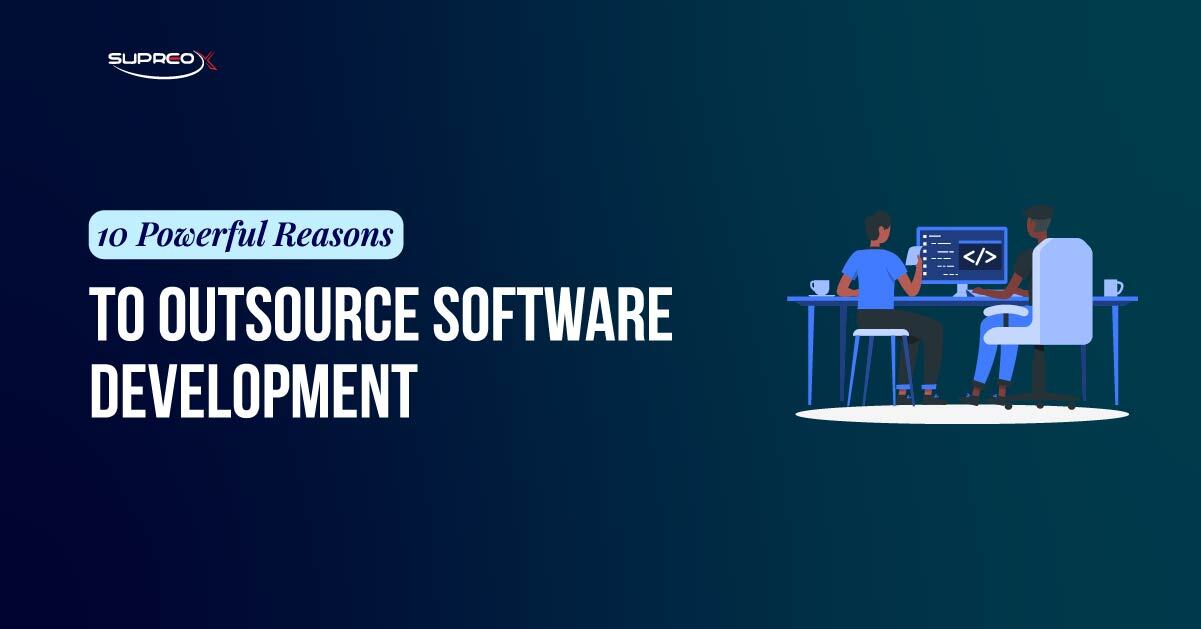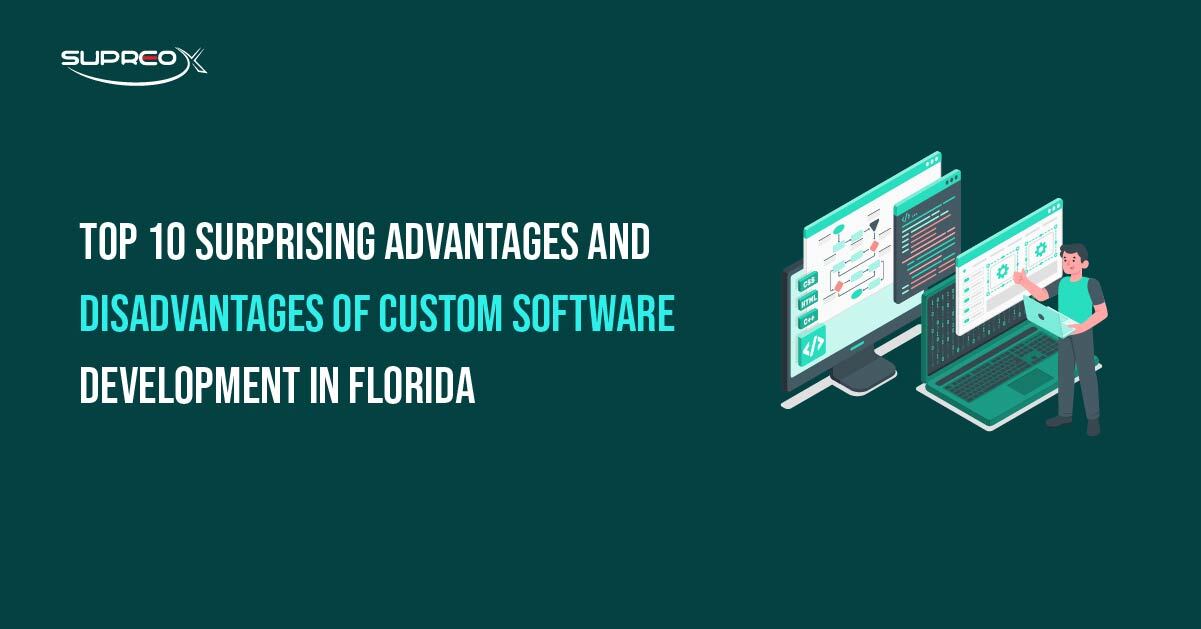Building tech in-house is expensive, slow, and sometimes downright chaotic. That’s why software development outsourcing has become popular in 2025. Companies are ditching the old ways and tapping into remote development teams to scale faster, innovate quicker, and save money.
Whether you’re a startup bootstrapping your first app or an enterprise going digital, outsourcing software solutions is the smart route to success.
What is Software Development Outsourcing and Why Does it Matter?
Outsourcing software development services means hiring an external company or dedicated development team to handle your tech projects. Instead of building everything in-house, you hand over tasks like app development, UX design, testing, and support to a third-party vendor.
When you outsource software solutions, you save money, make better products, access global talent, and adapt quickly to tech trends like AI integration, blockchain development, or cloud computing.
Common Use Cases for Software Outsourcing Services
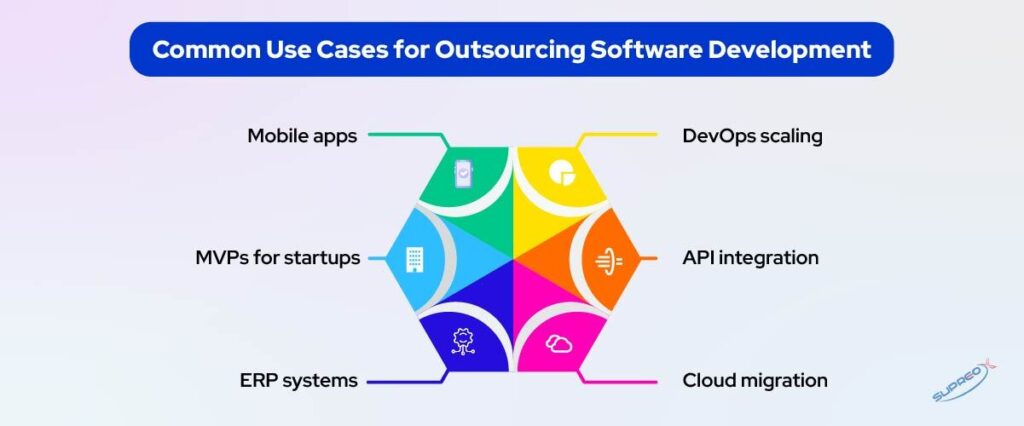
Here are some of the most common scenarios where businesses rely on outsourcing to drive results:
- Developing web or mobile applications
- Migrating to cloud-based infrastructure
- Building MVPs for startups
- Creating enterprise resource planning (ERP) systems
- Managing agile development cycles
- Integrating third-party APIs or IoT devices
- Scaling DevOps and continuous delivery pipelines
Top 10 Benefits of Outsourcing Software Development
From boosting productivity to accelerating delivery, the rewards for outsourcing software development are real and measurable. Let’s explore the top benefits that make outsourcing such a powerful option in 2025.
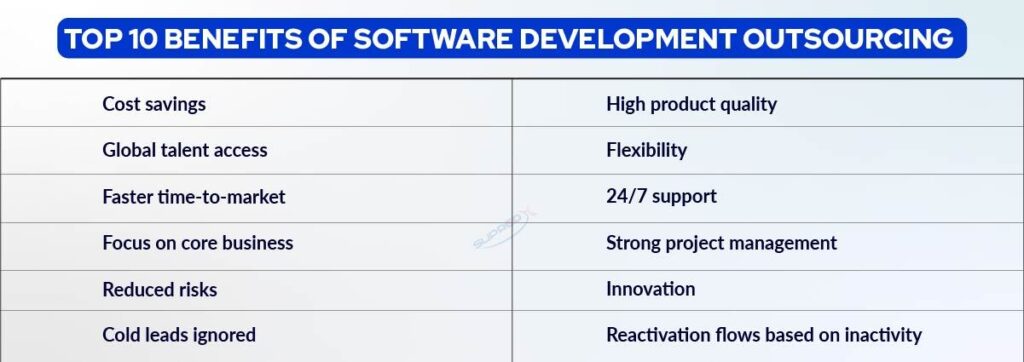
1. Cost-Effectiveness and Budget Control
One of the most significant benefits of outsourcing software development is the potential for major cost savings. Hiring full-time developers involves salaries, benefits, equipment, training, and office space. These hidden costs can quickly add up. By outsourcing, companies can avoid these overheads and only pay for the services they need.
Due to differences in living costs, offshore teams often offer competitive rates. Companies can choose between flexible pricing models such as fixed-price contracts or hourly billing, which allows them to stretch their budgets further without sacrificing quality.
2. Access to Global Talent Pool
Outsourcing gives you access to a world of highly skilled developers. You’re not limited to the talent available in your local market. You can find them through outsourcing if you need a backend engineer fluent in Python, a UX designer, or a cloud architect with AWS certification.
Countries like India, Bangladesh, and Argentina have become global hubs for software outsourcing because of their large, technically skilled workforces. Many developers bring fresh perspectives and deep technical knowledge that enrich your project and accelerate delivery.
3. Faster Time-to-Market
Speed is everything in tech. The faster you launch, the quicker you gather feedback and iterate. Software development outsourcing lets you start projects quickly without waiting weeks or months to hire and onboard a local team. Outsourcing partners already have the infrastructure and team members to hit the ground running.
Many vendors use agile or DevOps methodologies, which enable faster iterations and delivery cycles. This helps your business respond quickly to market changes and customer needs.
4. Focus on Core Business Operations
When you outsource development work, your in-house teams can focus on core business tasks such as strategy, customer service, and revenue generation. You don’t have to worry about writing code or fixing bugs; your internal departments can concentrate on their strengths. This is especially helpful for non-tech companies looking to digitize without getting lost in code.
5. Reduced Operational Risks
Developing software involves risk, such as missing deadlines, going over budget, or encountering technical setbacks. Outsourcing providers are equipped with processes and experienced personnel to handle these challenges. They bring best practices, risk mitigation strategies, and contract-based obligations safeguarding your project.
When you work with a reputable outsourcing partner, you reduce your exposure to common project pitfalls. Their established workflows and legal agreements provide clarity, accountability, and peace of mind. Most vendors use modern tools like Jira, Trello, or Asana to ensure complete transparency.
6. Enhanced Product Quality through Specialized Expertise
Outsourcing firms typically employ professionals specializing in every software development life cycle phase. This includes UI/UX designers, front-end and back-end developers, testers, DevOps engineers, and product managers.
Each expert brings deep domain knowledge and best practices that improve the quality of your software. Their experience from working on diverse projects means fewer bugs, better design, and a more stable final product. Outsourced QA teams also provide dedicated testing protocols to ensure your product works flawlessly before it hits the market. This layered expertise guarantees a higher-quality product, better performance, and fewer bugs post-launch.
7. Scalable and Flexible Resources
Outsourcing allows you to scale your development team up or down depending on your current workload. If you need to expand your team during a product launch or pull back during a maintenance phase, your outsourcing partner can adjust accordingly.
This flexibility is ideal for startups, SaaS companies, and enterprises launching new digital platforms. It’s much easier than hiring and training new staff for short-term needs.
8. 24/7 Development Cycle and Support
With teams spread across different time zones, work can continue even after your local team logs off. This round-the-clock development cycle speeds up delivery times and provides faster support.
If an issue arises after business hours, an offshore support team can often fix it before your next workday begins. This global coverage gives your product a competitive edge, especially in fast-moving markets.
9. Streamlined Project Management
Modern outsourcing firms use sophisticated tools and methodologies to ensure seamless collaboration and project tracking. You’ll typically get a dedicated project manager who oversees communication, progress, and deliverables. Agile sprints, daily stand-ups, and detailed reporting keep everyone on the same page.
This setup minimizes miscommunication and ensures that goals are met on time. You remain in control of the project without micromanaging, allowing you to focus on strategic decisions.
10. Innovation and Fresh Perspectives
Outsourcing brings a fresh set of eyes to your project. External teams work with clients across different industries and bring innovative solutions, new technologies, and alternative approaches to your software.
This diversity of experience often leads to creative breakthroughs that internal teams might overlook. If you’re looking to adopt the latest frameworks like React Native, Flutter, or Microservices, outsourcing teams usually have already worked with them and can guide you on best practices.
How Much Does Outsourced Software Development Cost in 2025?

Here’s a quick overview of average hourly rates for software development outsourcing in 2025:
On average, developers in Bangladesh or the Philippines may charge between $10 and $30 per hour, while Eastern European teams charge between $35 and $65 per hour. Latin American developers generally charge between $30 and $60 per hour. By contrast, developers in the US can charge anywhere from $100 to $200 per hour.
Factors That Influence Outsourcing Software Development Services Costs
The cost of outsourcing depends on several factors, including the project scope, required technologies, developers’ experience level, and the vendor’s geographic location.
The complexity of your project also affects the price. A basic mobile app costs significantly less than a large enterprise solution with multiple integrations and backend systems. Choosing between fixed-price contracts and hourly models also impacts your budget flexibility and control.
In-House Team vs. Outsourcing: Which is Better?
Outsourcing remains significantly cheaper than hiring a full-time in-house team. A senior software engineer in the US might cost $120,000 per year, not including benefits or overhead. Outsourcing lets you get the same quality of work for a fraction of the cost, and you only pay for the time spent on your project.
Advantages of Outsourcing Software Development vs Hiring In-House

When deciding how to build your software product, one major question arises: Should you hire an in-house team or outsource the work? Let’s break down why outsourcing often comes out ahead.
Staffing Flexibility and On-Demand Expertise
Outsourcing lets you fill technical gaps instantly. You don’t wait months for recruitment or onboarding. Need a React.js dev for two months? You’ve got it. Want a backend specialist for a few sprints? No problem.
Long-Term Financial Savings
Beyond developer salaries, consider the hidden costs of in-house teams:
- Office space
- Workstations and tools
- Taxes and HR compliance
- Ongoing training
With outsourcing, these headaches disappear.
Reduced HR and Administrative Overhead
Building an in-house team can be time-consuming, expensive, and restrictive. You must handle recruitment, onboarding, HR compliance, and long-term employment commitments. If your project is short-term or highly specialized, these investments often aren’t worth it.
Outsourcing, on the other hand, offers immediate access to experts without the administrative burden. You can hire on a project-by-project basis, scaling as needed. You also don’t need to worry about training, retention, or long-term salaries. The entire process becomes more agile and aligned with your actual needs.
Popular Software Outsourcing Models and What Works Best
Choosing the right model depends on your business goals, budget, and project complexity. But let’s decide by understanding the popular software outsourcing models.
Dedicated Team Model
Best for long-term projects with evolving requirements. You get a handpicked team working exclusively on your product.
Fixed-Price Model
Great for projects with a clear scope, deadlines, and budget. No surprises. Just deliverables.
Time and Material Model
This is perfect for startups and agile sprints, where flexibility is key. You pay for actual hours worked and materials used.
Which Model Fits Your Business Needs?
- Startups love Time and Materials
- Enterprises often prefer Dedicated Teams
- SMBs opt for Fixed-Price when the budget is tight
Key Risks of Outsourcing Software Development and How to Avoid Them?
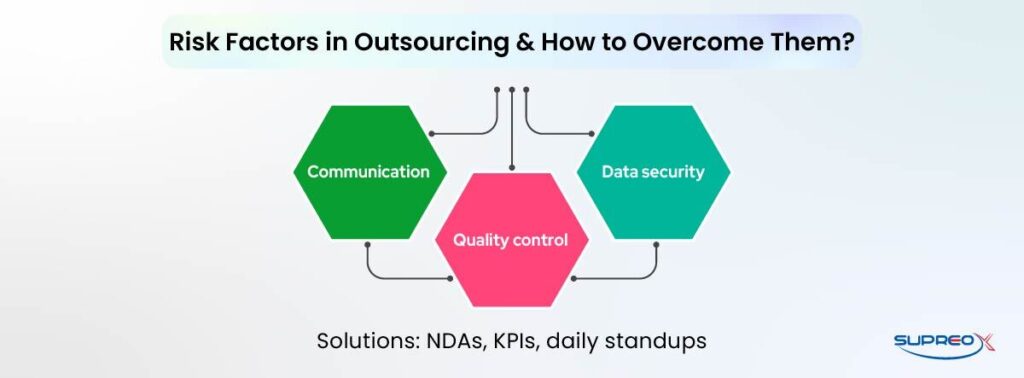
While outsourcing offers many advantages, it’s not without challenges. Here are the key risks of outsourcing software development services and how to avoid them.
Solution to Communication Barriers: Choose teams fluent in English, use daily stand-ups, and adopt clear documentation practices.
Solution to Data Security and IP Protection: Sign NDAs, ensure compliance with GDPR or HIPAA, and work with ISO-certified vendors.
Solution to Quality Control Issues: Insist on code reviews, automated testing, and transparent feedback loops.
Solution to Strategies to Mitigate These Risks:
- Start small with a pilot project
- Use collaboration tools like Slack, GitHub, and Zoom
- Set clear KPIs and expectations from day one
How to Choose the Right Outsourcing Software Development Partner?

If you know how to choose the right outsourcing software development Partner that delivers results.
Check Experience and Portfolio: Look for vendors with industry-specific case studies and live demos.
Evaluate Technical Expertise: Make sure they’re skilled in the languages, frameworks, and platforms your project needs.
Understand the Communication Style and Tools: Smooth communication is non-negotiable. Test it early on.
Prioritize Transparency and Project Reporting: Ensure regular updates, sprint reviews, and milestone tracking.
Future Trends in Software Outsourcing for 2025 and Beyond
The outsourcing industry continues to evolve. Learn the future trends of AI in software outsourcing.
AI and Automation in Outsourcing
AI-powered testing, automated code reviews, and chatbot integration are standard in 2025.
Rise of Nearshoring and Regional Hubs
Businesses now prefer nearshore outsourcing for time zone alignment and better cultural fit. Regions like Mexico, Poland, and Portugal are rising stars.
Enhanced Collaboration Tools for Remote Teams
New tools like Miro, ClickUp, and Notion transform how distributed teams collaborate in real time.
Is Outsourcing Software Development the Right Move for You?
Outsourcing is not only a cost-cutting tactic but also a smart strategy for innovation, speed, and scalability. In 2025, the benefits of outsourcing software development are too substantial to ignore. You gain access to world-class talent, improve product quality, and focus on growing your business while experts handle the technical side.
FAQs About Outsourcing Software Development
What is the main reason companies outsource software development?
Companies primarily outsource software development services to reduce costs and gain access to skilled professionals who deliver high-quality work efficiently.
How do I ensure quality in outsourced software projects?
Set clear expectations, monitor progress regularly, and choose vendors with strong reputations and proven track records.
What is the average hourly rate for outsourced developers?
Rates vary by location but typically range from $18 to $65 per hour for offshore and nearshore teams.
Can small businesses benefit from outsourcing software solutions?
Absolutely. Outsourcing allows small businesses to build scalable, high-quality software without heavy upfront investment.
Is outsourcing secure for handling sensitive business data?
Yes, as long as you partner with vendors who follow strict data protection standards and offer robust cybersecurity practices.

